In today's dynamic educational landscape, understanding and fostering motivation among college students is more crucial than ever. The recent podcast episode featuring Meg Foster, alongside experts Amy Baldwin and Laurie Hazzard, examined this complex topic, offering invaluable insights and strategies to help students navigate the challenge of motivation—understanding what motivation is and is not, how to find motivation, and how to stay motivated!
Understanding Motivation In College Students
At its core, motivation in college students can be understood through the lens of the direction and intensity of one's efforts toward academic goals. Students' motivation can be intrinsic, driven by an internal desire for achievement or learning, or extrinsic, propelled by external rewards or recognition. One strategy educators can deploy is to help students understand, identify, and name their unique motivational drivers, intrinsic or extrinsic.
Theories & Practical Insights On Motivation
It's helpful if college educators are familiar with motivational theories, including the attributional theory of achievement motivation, which considers how students attribute their successes or failures to internal or external factors. This understanding can significantly affect how they approach challenges and learning opportunities. For instance, if students believe their success in an assignment depends on their inherent ability (an internal factor), they may feel more in control and motivated than when they attribute success to external factors like luck or ease of the task.
Laurie introduced Dan Pink's TED talk on motivation, which emphasizes autonomy, mastery, and purpose (AMP) and offers a powerful framework for enhancing motivation. Educators can create a more motivating learning environment by giving students some choice in their assignments (autonomy), ensuring they feel adequately equipped to succeed (mastery), and clarifying the purpose behind tasks.
Challenges & Solutions
Laurie and Amy shared practical challenges students face, such as motivational slumps during the dreary mid-semester months, and provided actionable strategies to help students overcome these barriers. They highlighted two specific strategies for students including the concept of 'eating the frog,' which involves tackling the most daunting task first to get it out of the way, and the Pomodoro Technique, which breaks work into intervals. Both are straightforward and effective strategies for students to use to maintain motivation.
Applying Theoretical Insights To Practical Scenarios
Amy Baldwin's experience with students asking for quizzes as external motivators opened up a discussion on the developmental aspects of motivation. It highlighted the need for a balanced approach that gradually fosters internal motivation while recognizing the temporary need for external structures to maintain engagement and progress.
The conversation also underscored the importance of recognizing and addressing the unique challenges different students face, such as those working night shifts or managing heavy personal responsibilities. While maintaining academic standards, the need for flexibility was emphasized as crucial to effectively supporting diverse student needs. This adaptability is key to fostering a motivated academic environment.
Towards A Motivated Academic Environment
The insights from the podcast underscore the importance of understanding the psychological underpinnings of motivation and applying this knowledge through practical, empathetic approaches in the classroom. For college faculty and staff, integrating these insights means more than just applying theories; it involves actively engaging with students, understanding their contexts, and adapting educational practices to meet their varied needs. This highlights the important role of educators in fostering student motivation and success, making them feel valued and integral to the process.
By fostering an environment that values autonomy, mastery, and purpose, educators can enhance student motivation and empower them to take ownership of their learning. This, in turn, cultivates a more dynamic and supportive educational experience that prepares students both academically and personally for the challenges of the modern world.
The conversation between Meg, Amy, and Laurie provides a starting point for educators seeking to enhance their approaches to student motivation—with the ultimate goal of helping students be more engaged and successful!
Like To Learn More? Schedule A Demo
For nearly 20 years, Innovative Educators has been a trusted partner, assisting college leaders to build foundations of success for their students. Institutions have seen student engagement and retention increase significantly as a result of utilizing Go2Orientation, OnlineLingo and StudentLingo to onboard new students. Grounded in best practices for online learning, Innovative Educators student support tools are engaging, interactive, and community-building. Go2Orientation, OnlineLingo and StudentLingo together create a powerful online resource center providing comprehensive support to students throughout their academic journey. You can trust in the effectiveness of our resources to support your students' success.
Stay Updated!
Don't miss out on the latest insights and updates in student success strategies. Subscribe to our newsletter for regular updates, and follow us on LinkedIn, YouTube, Instagram, and Facebook to join our growing community of education innovators.
By Meg Foster, Online Learning & Design Specialist - Consultant & Wendy Archer, Web Content Coordinator
May 14, 2024



Comments 0